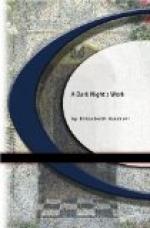“Do you remember our conversation last autumn, Ellinor?” he began at length.
Her head sunk. They were near a garden-seat, and she quietly sat down, without speaking.
“About some disgrace which you then fancied hung over you?” No answer. “Does it still hang over you?”
“Yes!” she whispered, with a heavy sigh.
“And your father knows this, of course?”
“Yes!” again, in the same tone; and then silence.
“I think it is doing him harm,” at length Ralph went on, decidedly.
“I am afraid it is,” she said, in a low tone.
“I wish you would tell me what it is,” he said, a little impatiently. “I might be able to help you about it.”
“No! you could not,” replied Ellinor. “I was sorry to my very heart to tell you what I did; I did not want help; all that is past. But I wanted to know if you thought that a person situated as I was, was justified in marrying any one ignorant of what might happen, what I do hope and trust never will.”
“But if I don’t know what you are alluding to in this mysterious way, you must see—don’t you see, love?—I am in the position of the ignorant man whom I think you said you could not feel it right to marry. Why don’t you tell me straight out what it is?” He could not help his irritation betraying itself in his tones and manner of speaking. She bent a little forward, and looked full into his face, as though to pierce to the very heart’s truth of him. Then she said, as quietly as she had ever spoken in her life,—“You wish to break off our engagement?”
He reddened and grew indignant in a moment. “What nonsense! Just because I ask a question and make a remark! I think your illness must have made you fanciful, Ellinor. Surely nothing I said deserves such an interpretation. On the contrary, have I not shown the sincerity and depth of my affection to you by clinging to you through—through everything?”
He was going to say “through the wearying opposition of my family,” but he stopped short, for he knew that the very fact of his mother’s opposition had only made him the more determined to have his own way in the first instance; and even now he did not intend to let out, what he had concealed up to this time, that his friends all regretted his imprudent engagement.
Ellinor sat silently gazing out upon the meadows, but seeing nothing. Then she put her hand into his. “I quite trust you, Ralph. I was wrong to doubt. I am afraid I have grown fanciful and silly.”
He was rather put to it for the right words, for she had precisely divined the dim thought that had overshadowed his mind when she had looked so intently at him. But he caressed her, and reassured her with fond words, as incoherent as lovers’ words generally are.
By-and-by they sauntered homewards. When they reached the house, Ellinor left him, and flew up to see how her father was. When Ralph went into his own room he was vexed with himself, both for what he had said and for what he had not said. His mental look-out was not satisfactory.




